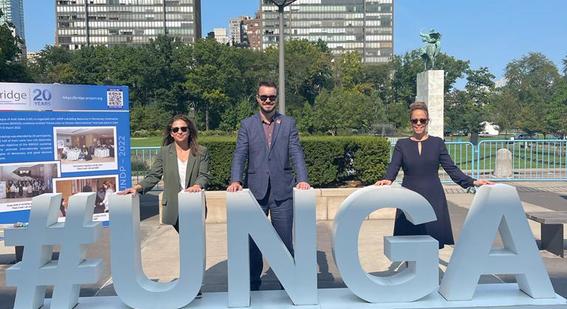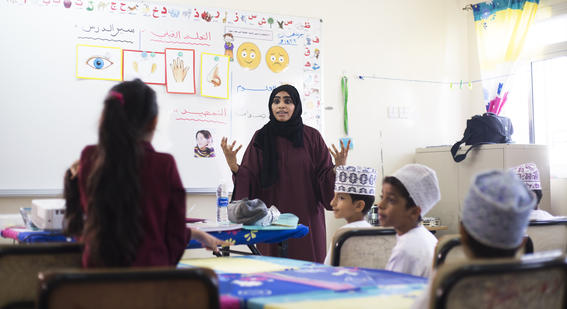Building intergenerational collaboration and leadership in transforming education systems: reflections from the Transforming Education Co-Action Summit (TECAS) – Austria
In May, our Managing Director Jane Mann and our Marketing Assistant Precious Olisaokafor were invited to attend the Transforming Education Co-Action Summit hosted by Salzburg Global Seminar, which focused on the role of intergenerational leadership and collaboration in transforming education systems.
Precious shares her reflections from the summit and the valuable lessons she’s learned on why intergenerational leadership and collaboration should be a priority in building effective and inclusive education systems for all generations and their experiences.
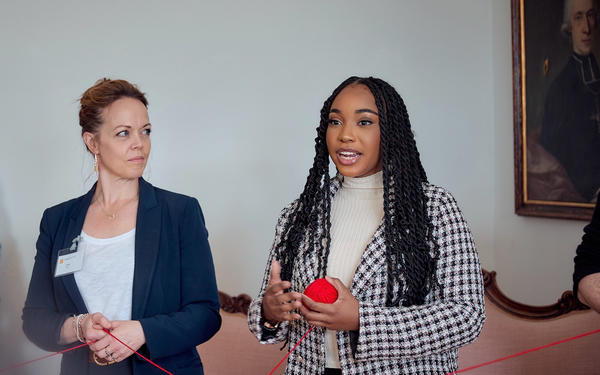
Quick Read
The Transforming Education Co-Action Summit is an inter-generational convention that looks to bring together participants from various generations and contexts to discuss the role of intergenerational leadership within the field of transforming education systems. It is a multi-year programme organised by the Salzburg Global Seminar and Big Change, that aims to grow in scope each year.
This year, the programme held its first convention for its ‘year 0’, which consisted of fellows from current partner organisations: Cambridge Partnership for Education, Learning Planet Institute, NCEE, Teach for All, YouthxYouth, Porticus, Qatar Foundation International, wom-en, WISE, and Restless Development. The event was held at the Salzburg Global Seminar’s headquarters at Schloss Leopoldskron in Austria.
The summit was preceded by virtual workshops and webinars to discuss the key learning questions centred around intergenerational leadership in education systems, and how the group would explore these principles for year 0 and effectively build on these ideas at the in-person convention.
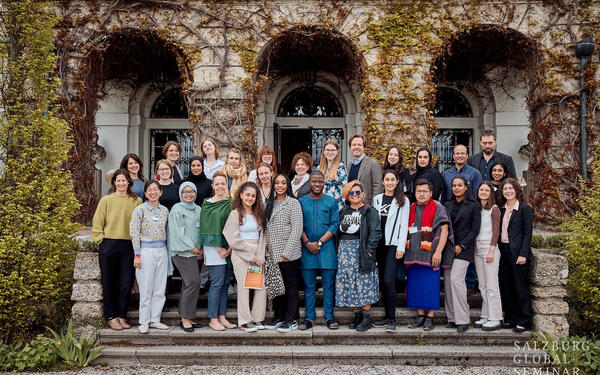
Intergenerational leadership – why is it important?
In this increasingly globalised era, we need to recognise the importance of shaping societies that are inclusive and representative. This means cultivating societies that work for the growth and empowerment of all communities. This is why intergenerational leadership in all its forms matters, and for it to be successful, collaboration and authentic inclusion must be implemented.
How can we reimagine systems to nurture value, trust, and develop capacity amongst people, particularly amongst younger and underrepresented generations to ensure valuable experiences are not left behind but actively included in decision-making processes and equipped to thrive in their contexts?
The Salzburg summit enabled me to co-create and collaborate with fellow workers within this space. I saw how powerful and necessary it is to come together to share ideas on the future of education, hearing from the voices of different generations. With a key aspect of the summit requiring a blend of organisation leaders and young fellows, some of the steps to cultivate diverse knowledge, talent and creativity were structurally evident.
Education systems and young people
Today, I see the purpose of education as supporting people to understand who they are, who they want to be and to find individual ways to fill this gap.
Dewina Leuschner, member of Teach For All’s first Student Leaders Advisory Council (SLAC), Germany
The rising youth population in some parts of the world requires us to understand the changing and growing roles of young people in their communities, education systems and in governments. It highlights how education shapes identities and brings forth questions about the different challenges that young people can face in navigating these changes and why partnering with younger generations to shape education systems will provide value and inspire innovation. Young people are vital stakeholders in shaping an education system as they are proportionately one of the largest groups affected by educational outputs.
Intergenerational collaboration and leadership ensures nobody’s left out. It brings different minds together and sparks some of the most creative and innovative solutions.
Aliyah Irabor-York, Youth Associate, Big Change and Founder of Pupil Power, London
Intergenerational collaboration and leadership is a lifelong learning process to make transformation happen, everyone has a role to play and a wisdom to share from the experience of the age that we are at.
Erioluwa Adeyinka, Executive Director, and Co-founder at YouthxYouth, Nigeria
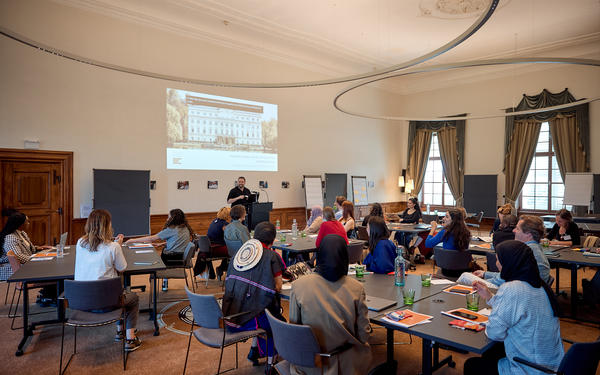
Collaboration and co-creation
Across the summit, some of the key themes discussed were:
- Acknowledging power-sharing
- Investing in allyship
- Re-imagining language and vocabulary
- People-centred discussion
Acknowledging power sharing
Being able to share my personal experiences and given the space to discuss with other young fellows and vibrant minds passionate about education development has been tremendously eye opening. It reinforced the necessity of empowering young voices to effectively contribute to education discussions that can be of value to them and the wider society. Thought-provoking discussions were had on identifying power dynamics, who is underrepresented? and how can there be a better integration of generations to ensure better distributions of power for equal engagement in education policies and representation?
Authentic allyship
Effective intergenerational collaboration also stems from our willingness to actively engage and contribute together. Fellows shared perspectives on building allyship and why co-creation is vital for intergenerational leadership. With young people and adults as allies and co-creators together we can work towards leveraging the full potential of all generations towards transforming education systems. This could be in how we partner together to create and share fresh ideas, policies, and outputs that support intergenerational leadership.
So often, older generations credit youth with being the ones who will solve some of the biggest problems – from global poverty to climate change – but how rarely do we see them making place for youth at the table, for meaningful collaboration, and supporting them in taking leadership roles? With Learning Poverty now at 70% globally, we need to ensure that we are all working together in a way that creates the most powerful solutions to address the significant problems in education. That’s why the Salzburg Global Seminar’s deliberately intergenerational approach to the Transforming Education Co-Action Summit is so refreshing.
Jane Mann, Managing Director, Cambridge Partnership for Education
Re-imagining language and vocabulary
Language allows us to better understand and explore the complexities around topics and their key principles. At the summit, we explored the value of language, recognising that in our reimagining of better education systems, our vocabulary is important for how we present our ideas and represent people. We discussed how intergenerational leadership is not just a matter of “old and young”, but the topic is also intersectional, and language can also vary based on context and different generations.
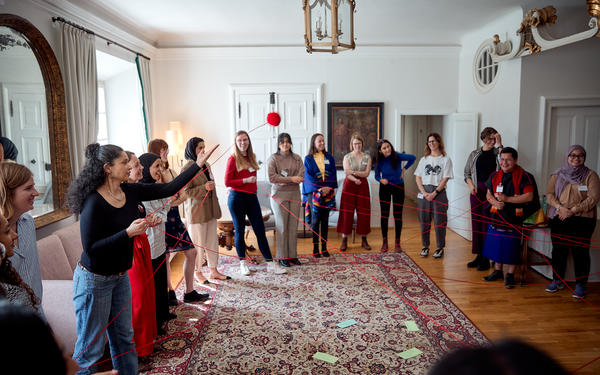
People-centred discussions
The TECAS program achieves a rare combination: it pushes my thinking to the limit, it changes profound mindsets, and it helps me create life-long relationships with leaders that are equally humbled, equally challenged and equally driven by a purpose.
Franco Mosso, CEO and Co-Founder, Enseña Peru, Peru
I would most definitely say, for me, the most valued aspect of the summit has been the incredible people it brought together and the community of learners and doers it has connected. There is value in learning from each other and coming together to use collective knowledge and resources for greater impact. Colleagues shared useful conversations on how the right research is valuable to the future of intergenerational leadership, for example engaging with authentic stories from diverse individuals and contexts and how this shapes our thoughts and processes for education transformation and policies.
Connecting societies to the challenges that the 21st century brings in a differentiated way is essential, the implications for each generation vary. However, strengthening critical thinking, problem-solving, collaboration, creativity, resilience, and technological literacy are key skills for everyone.
Daniela Baena Salazar, CEO, Wom-en, Colombia
We are really excited about this work and the chance to be part of this amazing constellation of partners. It feels like there is momentum and moral purpose behind the core idea of sharing power between generations in order to transform education. I hope we will see many more initiatives at the level of schools, education networks and education systems that embrace this work. The partners who met in Salzburg in May of this year are all working together to produce resources that will be freely available and useful for other individuals and organisations that want to explore these issues within their own contexts.
Dominic Regester, Program Director, Center for Education Transformation, Salzburg Global Seminar, Austria / United Kingdom
Overall, this summit has been a beautiful experience that has challenged me to consider new ideas. It has reminded me of the power of continuous learning and building wisdom to inspire transformation in education. Wisdom that empowers and produces personal and collective growth for a better world. I have been encouraged to not just look inwardly first, but also outwardly to make progress as individuals and within our organisations. Looking at my time with Cambridge Partnership for Education and Cambridge University Press & Assessment, this could be through the ways I share my experience as a young person in partnership with the work Cambridge undertakes with young people, junior colleagues and through our valuable internships and recent reverse mentoring pilot.
About the Author
Precious Olisa Okafor is a Marketing Assistant with the Cambridge Partnership for Education. She is passionate about international development, education, and public policy; particularly in advocating for increased engagement of young people’s voices in policy-making arenas. She holds a bachelor’s degree in history, politics and international relations and a Master of Science degree in Development Studies.



